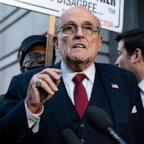Candidates make final push in Iowa
DES MOINES -- Presidential hopefuls offered their last appeals to Iowa voters Thursday but dodged outright predictions of victory as the campaigns shifted to getting supporters to turn out in the snow and freezing weather for tonight's crucial caucuses.
"I feel good, but it depends on who comes out, who decides to actually put on their coats, warm up their cars and go to the caucuses," said Democratic Sen. Hillary Rodham Clinton.
Republican Mitt Romney, who was once the clear front-runner in polls before the rise of former governor Mike Huckabee of Arkansas, said he'd settle for second place in Iowa's intense, but complicated, caucus process.
"I'd like to win them," Romney said of the early contests in Iowa and next week in New Hampshire. "But if I don't win, coming in second in these states is a strong statement."
As for Iowa, he said: "I think at this stage it's too close to call."
"Anything is possible at this point," said Sen. Barack Obama, D-Ill.
"We feel good about what we've done, but this is the beginning and not the end," he said.
Former senator Fred Thompson, of Tennessee, denied reports that he was considering dropping out of the GOP race after Iowa.
"At the end of the evening, things are going to look different to all of us," he told Tim Russert on MSNBC. Some may get shellacked, some may get a strong wind to our back. I expect a strong win. We'll see."
Former senator John Edwards, D-N.C., capped a 36-hour marathon campaign swing with a rally with rocker John Mellencamp. The grueling schedule turned Edwards' voice hoarse.
"I spent 20 years in courtrooms" fighting big companies, he told an Iowa City crowd. "You cannot 'nice' these people to death," Edwards said, obviously jabbing at Clinton and Obama's greater willingness to negotiate for change. "They will stomp all over you."
The caucuses, which can last as long as two hours, begin at 7 p.m. local time (8 p.m. ET), when supporters gather in 1,781 precinct halls to speak up for their candidate.
In the complex process, candidates must draw at least 15% of support of caucus-goers. One reason the outcome is hard to predict is because the supporters for candidates who fail to reach the threshold can then throw their backing to other candidates.
Altogether, 120,000 to 150,000 people are expected to come to the Democratic caucuses and 80,000 to 90,000 to the GOP meetings.
Iowa Democratic Sen. Tom Harkin, who is neutral in this year's race, called it "the most interesting I have ever seen" because, after a year of campaigning, "there is no clear front-runner."




